2019 May Semester LAWS13-529 Advanced Dispute Resolution Exam Answers
VerifiedAdded on 2022/10/12
|23
|6335
|191
Homework Assignment
AI Summary
This document contains the answers to the LAWS13-529 Advanced Dispute Resolution (ADR) final examination from the May 2019 semester. The exam comprised short-answer questions, with students required to select and answer four questions from a provided list. The answers cover a range of topics within ADR, including mediation, negotiation skills, the role of judges versus mediators, power imbalances in mediation, and the use of negotiation skills in business communication and international disputes. The student explores the characteristics, phases, and definitions of mediation, comparing it with negotiation and examining the roles of mediators and judges in resolving conflicts. The assignment also delves into the importance of communication skills, active listening, and the impact of power dynamics in achieving equitable outcomes in mediation, particularly in family disputes.
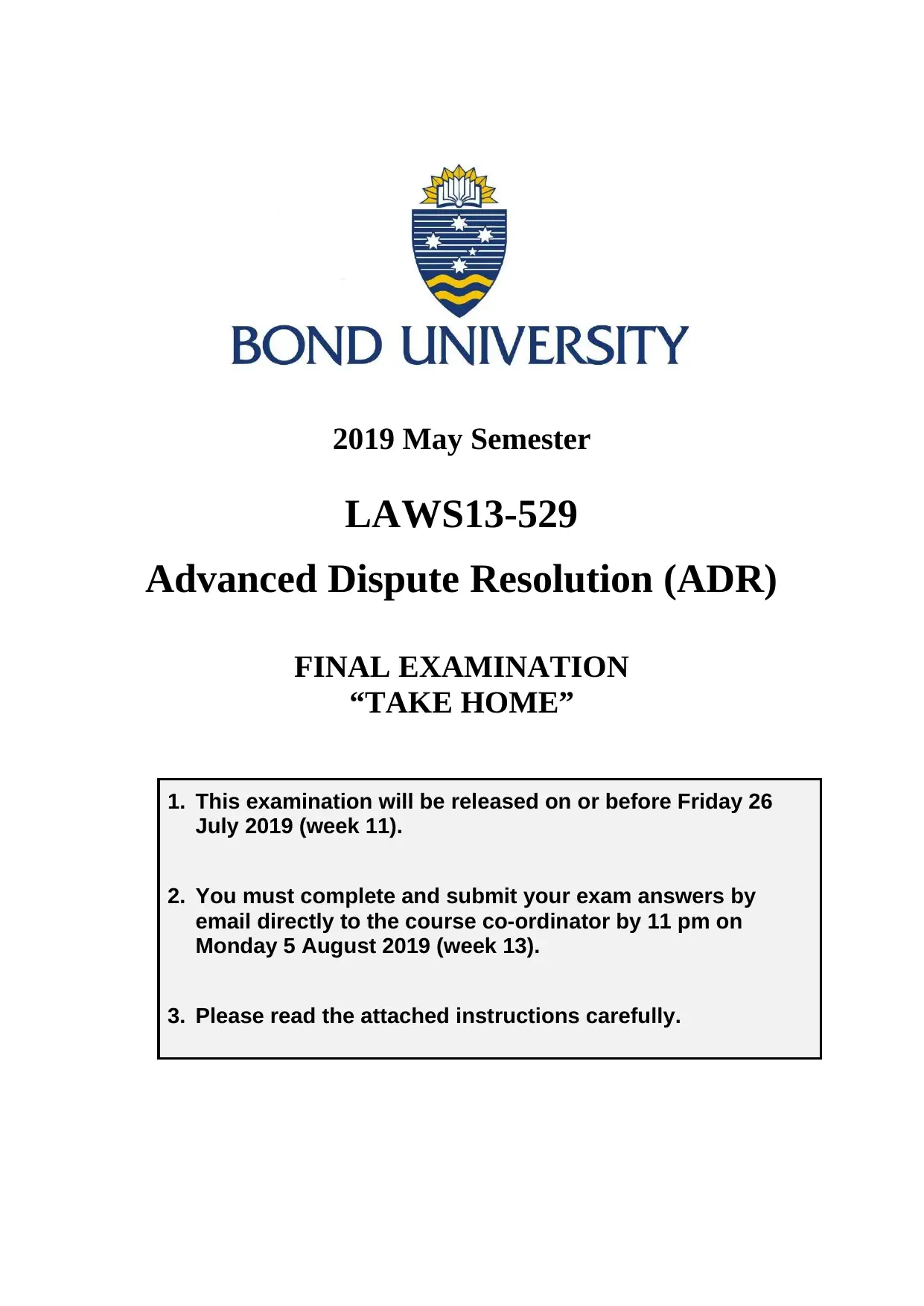
2019 May Semester
LAWS13-529
Advanced Dispute Resolution (ADR)
FINAL EXAMINATION
“TAKE HOME”
1. This examination will be released on or before Friday 26
July 2019 (week 11).
2. You must complete and submit your exam answers by
email directly to the course co-ordinator by 11 pm on
Monday 5 August 2019 (week 13).
3. Please read the attached instructions carefully.
LAWS13-529
Advanced Dispute Resolution (ADR)
FINAL EXAMINATION
“TAKE HOME”
1. This examination will be released on or before Friday 26
July 2019 (week 11).
2. You must complete and submit your exam answers by
email directly to the course co-ordinator by 11 pm on
Monday 5 August 2019 (week 13).
3. Please read the attached instructions carefully.
Paraphrase This Document
Need a fresh take? Get an instant paraphrase of this document with our AI Paraphraser
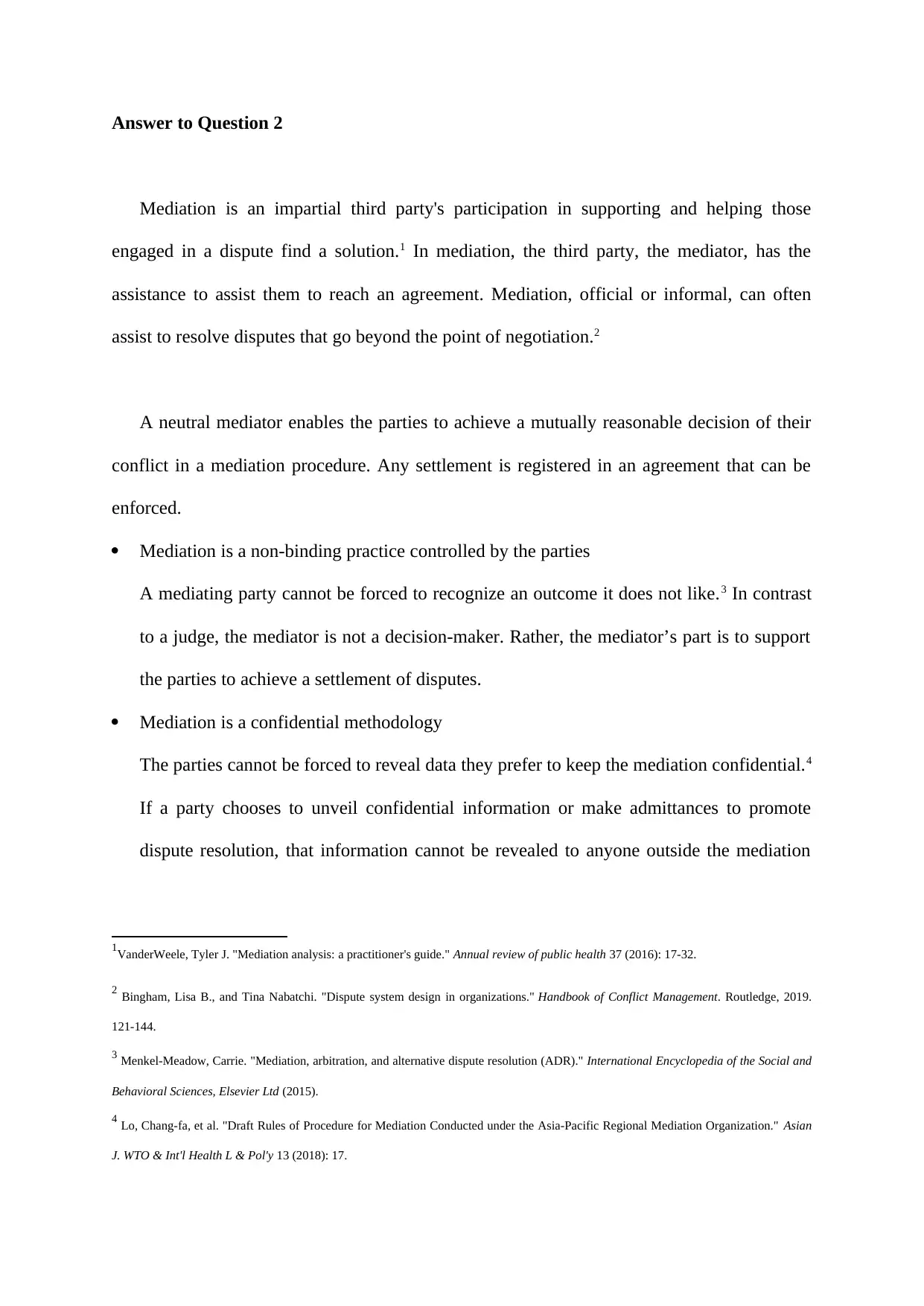
Answer to Question 2
Mediation is an impartial third party's participation in supporting and helping those
engaged in a dispute find a solution.1 In mediation, the third party, the mediator, has the
assistance to assist them to reach an agreement. Mediation, official or informal, can often
assist to resolve disputes that go beyond the point of negotiation.2
A neutral mediator enables the parties to achieve a mutually reasonable decision of their
conflict in a mediation procedure. Any settlement is registered in an agreement that can be
enforced.
Mediation is a non-binding practice controlled by the parties
A mediating party cannot be forced to recognize an outcome it does not like.3 In contrast
to a judge, the mediator is not a decision-maker. Rather, the mediator’s part is to support
the parties to achieve a settlement of disputes.
Mediation is a confidential methodology
The parties cannot be forced to reveal data they prefer to keep the mediation confidential.4
If a party chooses to unveil confidential information or make admittances to promote
dispute resolution, that information cannot be revealed to anyone outside the mediation
1VanderWeele, Tyler J. "Mediation analysis: a practitioner's guide." Annual review of public health 37 (2016): 17-32.
2 Bingham, Lisa B., and Tina Nabatchi. "Dispute system design in organizations." Handbook of Conflict Management. Routledge, 2019.
121-144.
3 Menkel-Meadow, Carrie. "Mediation, arbitration, and alternative dispute resolution (ADR)." International Encyclopedia of the Social and
Behavioral Sciences, Elsevier Ltd (2015).
4 Lo, Chang-fa, et al. "Draft Rules of Procedure for Mediation Conducted under the Asia-Pacific Regional Mediation Organization." Asian
J. WTO & Int'l Health L & Pol'y 13 (2018): 17.
Mediation is an impartial third party's participation in supporting and helping those
engaged in a dispute find a solution.1 In mediation, the third party, the mediator, has the
assistance to assist them to reach an agreement. Mediation, official or informal, can often
assist to resolve disputes that go beyond the point of negotiation.2
A neutral mediator enables the parties to achieve a mutually reasonable decision of their
conflict in a mediation procedure. Any settlement is registered in an agreement that can be
enforced.
Mediation is a non-binding practice controlled by the parties
A mediating party cannot be forced to recognize an outcome it does not like.3 In contrast
to a judge, the mediator is not a decision-maker. Rather, the mediator’s part is to support
the parties to achieve a settlement of disputes.
Mediation is a confidential methodology
The parties cannot be forced to reveal data they prefer to keep the mediation confidential.4
If a party chooses to unveil confidential information or make admittances to promote
dispute resolution, that information cannot be revealed to anyone outside the mediation
1VanderWeele, Tyler J. "Mediation analysis: a practitioner's guide." Annual review of public health 37 (2016): 17-32.
2 Bingham, Lisa B., and Tina Nabatchi. "Dispute system design in organizations." Handbook of Conflict Management. Routledge, 2019.
121-144.
3 Menkel-Meadow, Carrie. "Mediation, arbitration, and alternative dispute resolution (ADR)." International Encyclopedia of the Social and
Behavioral Sciences, Elsevier Ltd (2015).
4 Lo, Chang-fa, et al. "Draft Rules of Procedure for Mediation Conducted under the Asia-Pacific Regional Mediation Organization." Asian
J. WTO & Int'l Health L & Pol'y 13 (2018): 17.
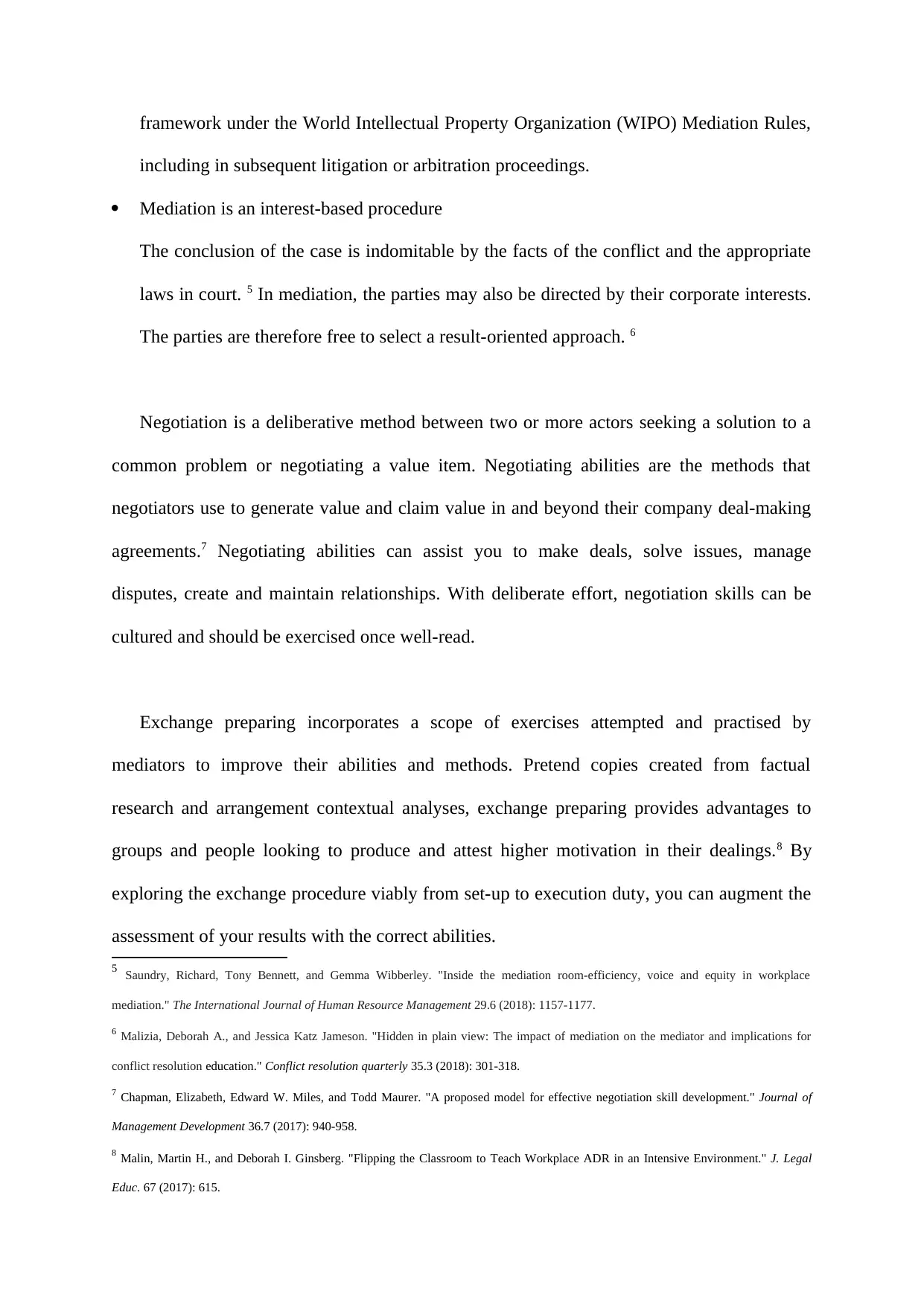
framework under the World Intellectual Property Organization (WIPO) Mediation Rules,
including in subsequent litigation or arbitration proceedings.
Mediation is an interest-based procedure
The conclusion of the case is indomitable by the facts of the conflict and the appropriate
laws in court. 5 In mediation, the parties may also be directed by their corporate interests.
The parties are therefore free to select a result-oriented approach. 6
Negotiation is a deliberative method between two or more actors seeking a solution to a
common problem or negotiating a value item. Negotiating abilities are the methods that
negotiators use to generate value and claim value in and beyond their company deal-making
agreements.7 Negotiating abilities can assist you to make deals, solve issues, manage
disputes, create and maintain relationships. With deliberate effort, negotiation skills can be
cultured and should be exercised once well-read.
Exchange preparing incorporates a scope of exercises attempted and practised by
mediators to improve their abilities and methods. Pretend copies created from factual
research and arrangement contextual analyses, exchange preparing provides advantages to
groups and people looking to produce and attest higher motivation in their dealings.8 By
exploring the exchange procedure viably from set-up to execution duty, you can augment the
assessment of your results with the correct abilities.
5 Saundry, Richard, Tony Bennett, and Gemma Wibberley. "Inside the mediation room-efficiency, voice and equity in workplace
mediation." The International Journal of Human Resource Management 29.6 (2018): 1157-1177.
6 Malizia, Deborah A., and Jessica Katz Jameson. "Hidden in plain view: The impact of mediation on the mediator and implications for
conflict resolution education." Conflict resolution quarterly 35.3 (2018): 301-318.
7 Chapman, Elizabeth, Edward W. Miles, and Todd Maurer. "A proposed model for effective negotiation skill development." Journal of
Management Development 36.7 (2017): 940-958.
8 Malin, Martin H., and Deborah I. Ginsberg. "Flipping the Classroom to Teach Workplace ADR in an Intensive Environment." J. Legal
Educ. 67 (2017): 615.
including in subsequent litigation or arbitration proceedings.
Mediation is an interest-based procedure
The conclusion of the case is indomitable by the facts of the conflict and the appropriate
laws in court. 5 In mediation, the parties may also be directed by their corporate interests.
The parties are therefore free to select a result-oriented approach. 6
Negotiation is a deliberative method between two or more actors seeking a solution to a
common problem or negotiating a value item. Negotiating abilities are the methods that
negotiators use to generate value and claim value in and beyond their company deal-making
agreements.7 Negotiating abilities can assist you to make deals, solve issues, manage
disputes, create and maintain relationships. With deliberate effort, negotiation skills can be
cultured and should be exercised once well-read.
Exchange preparing incorporates a scope of exercises attempted and practised by
mediators to improve their abilities and methods. Pretend copies created from factual
research and arrangement contextual analyses, exchange preparing provides advantages to
groups and people looking to produce and attest higher motivation in their dealings.8 By
exploring the exchange procedure viably from set-up to execution duty, you can augment the
assessment of your results with the correct abilities.
5 Saundry, Richard, Tony Bennett, and Gemma Wibberley. "Inside the mediation room-efficiency, voice and equity in workplace
mediation." The International Journal of Human Resource Management 29.6 (2018): 1157-1177.
6 Malizia, Deborah A., and Jessica Katz Jameson. "Hidden in plain view: The impact of mediation on the mediator and implications for
conflict resolution education." Conflict resolution quarterly 35.3 (2018): 301-318.
7 Chapman, Elizabeth, Edward W. Miles, and Todd Maurer. "A proposed model for effective negotiation skill development." Journal of
Management Development 36.7 (2017): 940-958.
8 Malin, Martin H., and Deborah I. Ginsberg. "Flipping the Classroom to Teach Workplace ADR in an Intensive Environment." J. Legal
Educ. 67 (2017): 615.
⊘ This is a preview!⊘
Do you want full access?
Subscribe today to unlock all pages.

Trusted by 1+ million students worldwide
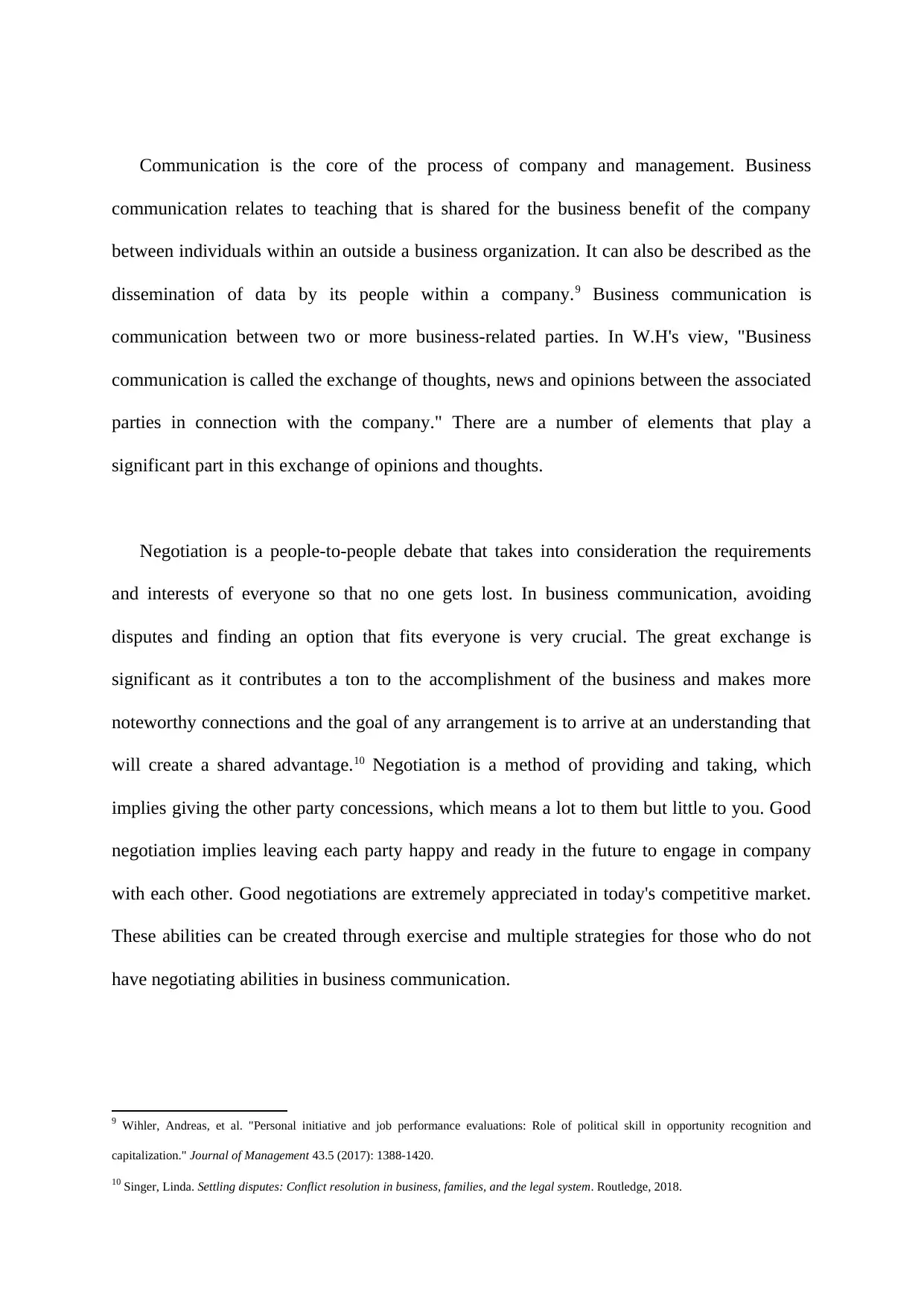
Communication is the core of the process of company and management. Business
communication relates to teaching that is shared for the business benefit of the company
between individuals within an outside a business organization. It can also be described as the
dissemination of data by its people within a company.9 Business communication is
communication between two or more business-related parties. In W.H's view, "Business
communication is called the exchange of thoughts, news and opinions between the associated
parties in connection with the company." There are a number of elements that play a
significant part in this exchange of opinions and thoughts.
Negotiation is a people-to-people debate that takes into consideration the requirements
and interests of everyone so that no one gets lost. In business communication, avoiding
disputes and finding an option that fits everyone is very crucial. The great exchange is
significant as it contributes a ton to the accomplishment of the business and makes more
noteworthy connections and the goal of any arrangement is to arrive at an understanding that
will create a shared advantage.10 Negotiation is a method of providing and taking, which
implies giving the other party concessions, which means a lot to them but little to you. Good
negotiation implies leaving each party happy and ready in the future to engage in company
with each other. Good negotiations are extremely appreciated in today's competitive market.
These abilities can be created through exercise and multiple strategies for those who do not
have negotiating abilities in business communication.
9 Wihler, Andreas, et al. "Personal initiative and job performance evaluations: Role of political skill in opportunity recognition and
capitalization." Journal of Management 43.5 (2017): 1388-1420.
10 Singer, Linda. Settling disputes: Conflict resolution in business, families, and the legal system. Routledge, 2018.
communication relates to teaching that is shared for the business benefit of the company
between individuals within an outside a business organization. It can also be described as the
dissemination of data by its people within a company.9 Business communication is
communication between two or more business-related parties. In W.H's view, "Business
communication is called the exchange of thoughts, news and opinions between the associated
parties in connection with the company." There are a number of elements that play a
significant part in this exchange of opinions and thoughts.
Negotiation is a people-to-people debate that takes into consideration the requirements
and interests of everyone so that no one gets lost. In business communication, avoiding
disputes and finding an option that fits everyone is very crucial. The great exchange is
significant as it contributes a ton to the accomplishment of the business and makes more
noteworthy connections and the goal of any arrangement is to arrive at an understanding that
will create a shared advantage.10 Negotiation is a method of providing and taking, which
implies giving the other party concessions, which means a lot to them but little to you. Good
negotiation implies leaving each party happy and ready in the future to engage in company
with each other. Good negotiations are extremely appreciated in today's competitive market.
These abilities can be created through exercise and multiple strategies for those who do not
have negotiating abilities in business communication.
9 Wihler, Andreas, et al. "Personal initiative and job performance evaluations: Role of political skill in opportunity recognition and
capitalization." Journal of Management 43.5 (2017): 1388-1420.
10 Singer, Linda. Settling disputes: Conflict resolution in business, families, and the legal system. Routledge, 2018.
Paraphrase This Document
Need a fresh take? Get an instant paraphrase of this document with our AI Paraphraser
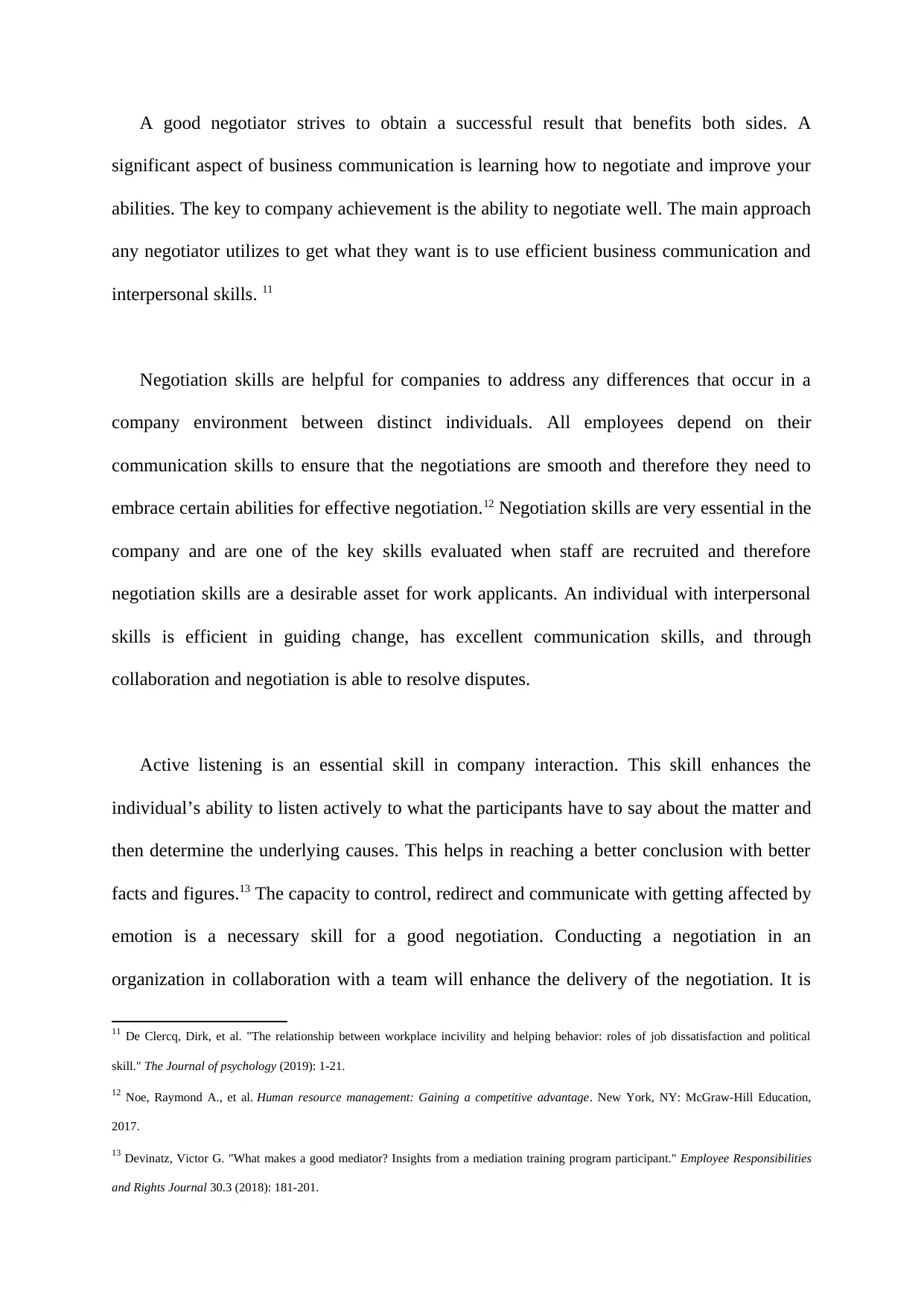
A good negotiator strives to obtain a successful result that benefits both sides. A
significant aspect of business communication is learning how to negotiate and improve your
abilities. The key to company achievement is the ability to negotiate well. The main approach
any negotiator utilizes to get what they want is to use efficient business communication and
interpersonal skills. 11
Negotiation skills are helpful for companies to address any differences that occur in a
company environment between distinct individuals. All employees depend on their
communication skills to ensure that the negotiations are smooth and therefore they need to
embrace certain abilities for effective negotiation.12 Negotiation skills are very essential in the
company and are one of the key skills evaluated when staff are recruited and therefore
negotiation skills are a desirable asset for work applicants. An individual with interpersonal
skills is efficient in guiding change, has excellent communication skills, and through
collaboration and negotiation is able to resolve disputes.
Active listening is an essential skill in company interaction. This skill enhances the
individual’s ability to listen actively to what the participants have to say about the matter and
then determine the underlying causes. This helps in reaching a better conclusion with better
facts and figures.13 The capacity to control, redirect and communicate with getting affected by
emotion is a necessary skill for a good negotiation. Conducting a negotiation in an
organization in collaboration with a team will enhance the delivery of the negotiation. It is
11 De Clercq, Dirk, et al. "The relationship between workplace incivility and helping behavior: roles of job dissatisfaction and political
skill." The Journal of psychology (2019): 1-21.
12 Noe, Raymond A., et al. Human resource management: Gaining a competitive advantage. New York, NY: McGraw-Hill Education,
2017.
13 Devinatz, Victor G. "What makes a good mediator? Insights from a mediation training program participant." Employee Responsibilities
and Rights Journal 30.3 (2018): 181-201.
significant aspect of business communication is learning how to negotiate and improve your
abilities. The key to company achievement is the ability to negotiate well. The main approach
any negotiator utilizes to get what they want is to use efficient business communication and
interpersonal skills. 11
Negotiation skills are helpful for companies to address any differences that occur in a
company environment between distinct individuals. All employees depend on their
communication skills to ensure that the negotiations are smooth and therefore they need to
embrace certain abilities for effective negotiation.12 Negotiation skills are very essential in the
company and are one of the key skills evaluated when staff are recruited and therefore
negotiation skills are a desirable asset for work applicants. An individual with interpersonal
skills is efficient in guiding change, has excellent communication skills, and through
collaboration and negotiation is able to resolve disputes.
Active listening is an essential skill in company interaction. This skill enhances the
individual’s ability to listen actively to what the participants have to say about the matter and
then determine the underlying causes. This helps in reaching a better conclusion with better
facts and figures.13 The capacity to control, redirect and communicate with getting affected by
emotion is a necessary skill for a good negotiation. Conducting a negotiation in an
organization in collaboration with a team will enhance the delivery of the negotiation. It is
11 De Clercq, Dirk, et al. "The relationship between workplace incivility and helping behavior: roles of job dissatisfaction and political
skill." The Journal of psychology (2019): 1-21.
12 Noe, Raymond A., et al. Human resource management: Gaining a competitive advantage. New York, NY: McGraw-Hill Education,
2017.
13 Devinatz, Victor G. "What makes a good mediator? Insights from a mediation training program participant." Employee Responsibilities
and Rights Journal 30.3 (2018): 181-201.
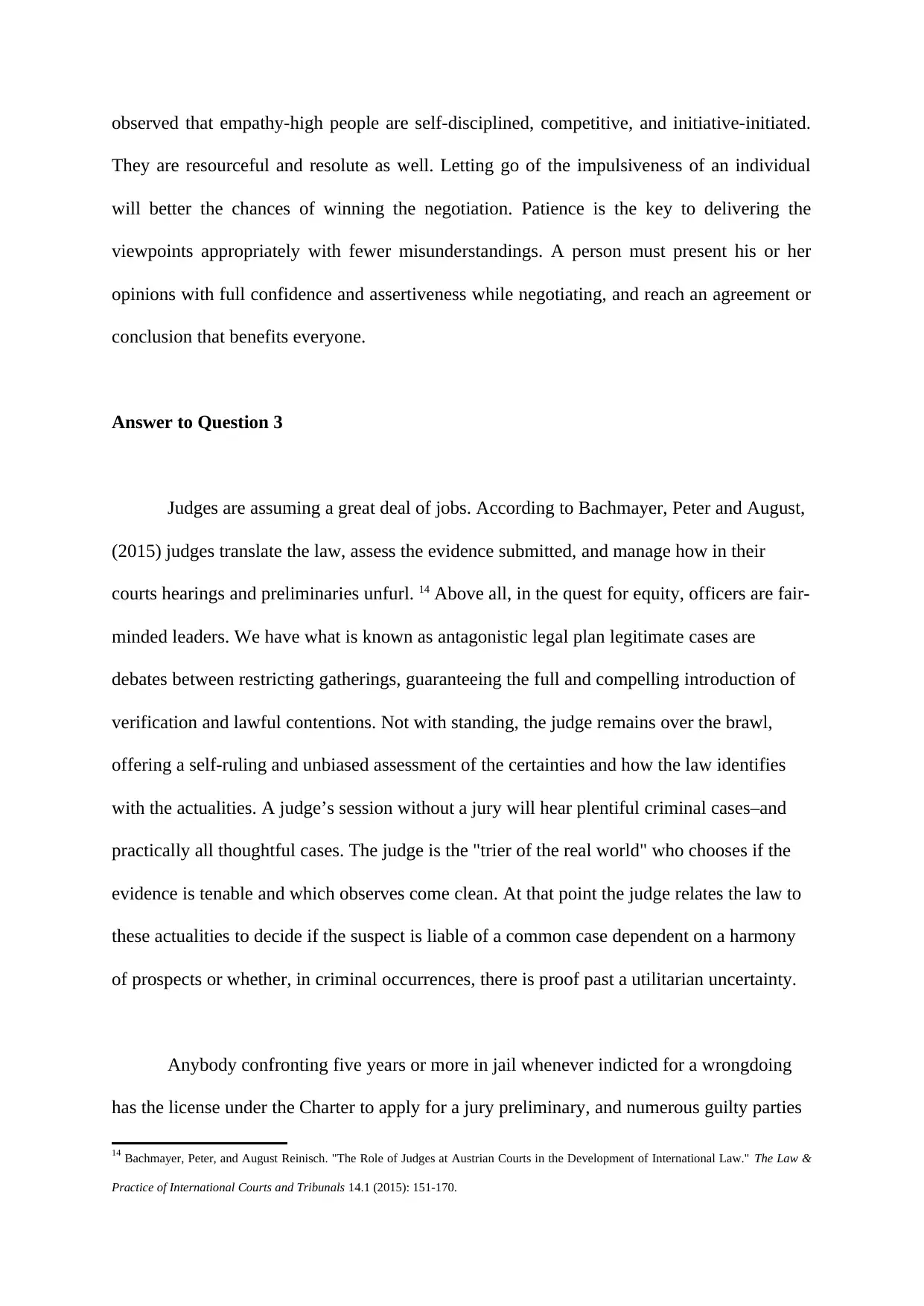
observed that empathy-high people are self-disciplined, competitive, and initiative-initiated.
They are resourceful and resolute as well. Letting go of the impulsiveness of an individual
will better the chances of winning the negotiation. Patience is the key to delivering the
viewpoints appropriately with fewer misunderstandings. A person must present his or her
opinions with full confidence and assertiveness while negotiating, and reach an agreement or
conclusion that benefits everyone.
Answer to Question 3
Judges are assuming a great deal of jobs. According to Bachmayer, Peter and August,
(2015) judges translate the law, assess the evidence submitted, and manage how in their
courts hearings and preliminaries unfurl. 14 Above all, in the quest for equity, officers are fair-
minded leaders. We have what is known as antagonistic legal plan legitimate cases are
debates between restricting gatherings, guaranteeing the full and compelling introduction of
verification and lawful contentions. Not with standing, the judge remains over the brawl,
offering a self-ruling and unbiased assessment of the certainties and how the law identifies
with the actualities. A judge’s session without a jury will hear plentiful criminal cases–and
practically all thoughtful cases. The judge is the "trier of the real world" who chooses if the
evidence is tenable and which observes come clean. At that point the judge relates the law to
these actualities to decide if the suspect is liable of a common case dependent on a harmony
of prospects or whether, in criminal occurrences, there is proof past a utilitarian uncertainty.
Anybody confronting five years or more in jail whenever indicted for a wrongdoing
has the license under the Charter to apply for a jury preliminary, and numerous guilty parties
14 Bachmayer, Peter, and August Reinisch. "The Role of Judges at Austrian Courts in the Development of International Law." The Law &
Practice of International Courts and Tribunals 14.1 (2015): 151-170.
They are resourceful and resolute as well. Letting go of the impulsiveness of an individual
will better the chances of winning the negotiation. Patience is the key to delivering the
viewpoints appropriately with fewer misunderstandings. A person must present his or her
opinions with full confidence and assertiveness while negotiating, and reach an agreement or
conclusion that benefits everyone.
Answer to Question 3
Judges are assuming a great deal of jobs. According to Bachmayer, Peter and August,
(2015) judges translate the law, assess the evidence submitted, and manage how in their
courts hearings and preliminaries unfurl. 14 Above all, in the quest for equity, officers are fair-
minded leaders. We have what is known as antagonistic legal plan legitimate cases are
debates between restricting gatherings, guaranteeing the full and compelling introduction of
verification and lawful contentions. Not with standing, the judge remains over the brawl,
offering a self-ruling and unbiased assessment of the certainties and how the law identifies
with the actualities. A judge’s session without a jury will hear plentiful criminal cases–and
practically all thoughtful cases. The judge is the "trier of the real world" who chooses if the
evidence is tenable and which observes come clean. At that point the judge relates the law to
these actualities to decide if the suspect is liable of a common case dependent on a harmony
of prospects or whether, in criminal occurrences, there is proof past a utilitarian uncertainty.
Anybody confronting five years or more in jail whenever indicted for a wrongdoing
has the license under the Charter to apply for a jury preliminary, and numerous guilty parties
14 Bachmayer, Peter, and August Reinisch. "The Role of Judges at Austrian Courts in the Development of International Law." The Law &
Practice of International Courts and Tribunals 14.1 (2015): 151-170.
⊘ This is a preview!⊘
Do you want full access?
Subscribe today to unlock all pages.

Trusted by 1+ million students worldwide
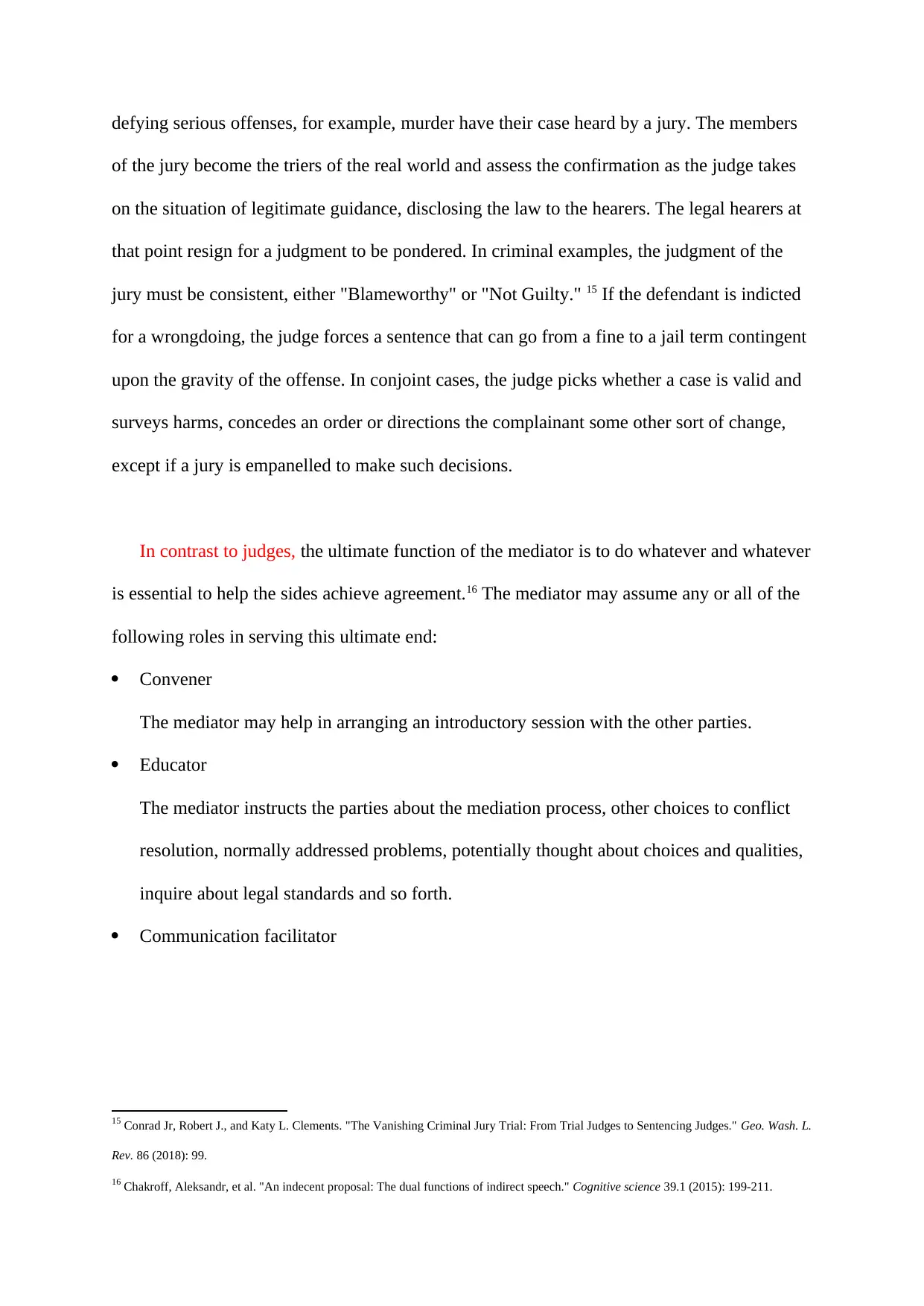
defying serious offenses, for example, murder have their case heard by a jury. The members
of the jury become the triers of the real world and assess the confirmation as the judge takes
on the situation of legitimate guidance, disclosing the law to the hearers. The legal hearers at
that point resign for a judgment to be pondered. In criminal examples, the judgment of the
jury must be consistent, either "Blameworthy" or "Not Guilty." 15 If the defendant is indicted
for a wrongdoing, the judge forces a sentence that can go from a fine to a jail term contingent
upon the gravity of the offense. In conjoint cases, the judge picks whether a case is valid and
surveys harms, concedes an order or directions the complainant some other sort of change,
except if a jury is empanelled to make such decisions.
In contrast to judges, the ultimate function of the mediator is to do whatever and whatever
is essential to help the sides achieve agreement.16 The mediator may assume any or all of the
following roles in serving this ultimate end:
Convener
The mediator may help in arranging an introductory session with the other parties.
Educator
The mediator instructs the parties about the mediation process, other choices to conflict
resolution, normally addressed problems, potentially thought about choices and qualities,
inquire about legal standards and so forth.
Communication facilitator
15 Conrad Jr, Robert J., and Katy L. Clements. "The Vanishing Criminal Jury Trial: From Trial Judges to Sentencing Judges." Geo. Wash. L.
Rev. 86 (2018): 99.
16 Chakroff, Aleksandr, et al. "An indecent proposal: The dual functions of indirect speech." Cognitive science 39.1 (2015): 199-211.
of the jury become the triers of the real world and assess the confirmation as the judge takes
on the situation of legitimate guidance, disclosing the law to the hearers. The legal hearers at
that point resign for a judgment to be pondered. In criminal examples, the judgment of the
jury must be consistent, either "Blameworthy" or "Not Guilty." 15 If the defendant is indicted
for a wrongdoing, the judge forces a sentence that can go from a fine to a jail term contingent
upon the gravity of the offense. In conjoint cases, the judge picks whether a case is valid and
surveys harms, concedes an order or directions the complainant some other sort of change,
except if a jury is empanelled to make such decisions.
In contrast to judges, the ultimate function of the mediator is to do whatever and whatever
is essential to help the sides achieve agreement.16 The mediator may assume any or all of the
following roles in serving this ultimate end:
Convener
The mediator may help in arranging an introductory session with the other parties.
Educator
The mediator instructs the parties about the mediation process, other choices to conflict
resolution, normally addressed problems, potentially thought about choices and qualities,
inquire about legal standards and so forth.
Communication facilitator
15 Conrad Jr, Robert J., and Katy L. Clements. "The Vanishing Criminal Jury Trial: From Trial Judges to Sentencing Judges." Geo. Wash. L.
Rev. 86 (2018): 99.
16 Chakroff, Aleksandr, et al. "An indecent proposal: The dual functions of indirect speech." Cognitive science 39.1 (2015): 199-211.
Paraphrase This Document
Need a fresh take? Get an instant paraphrase of this document with our AI Paraphraser
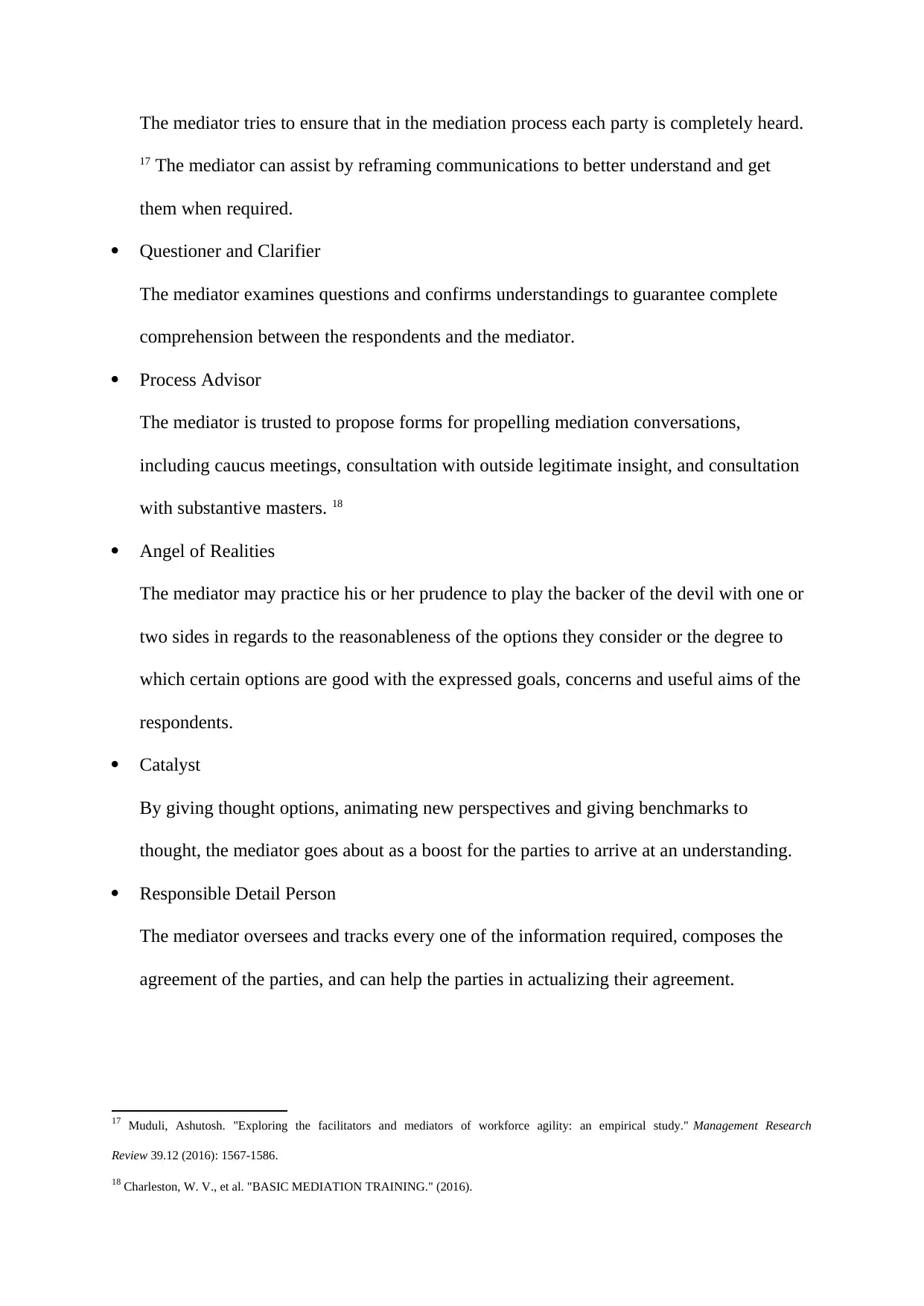
The mediator tries to ensure that in the mediation process each party is completely heard.
17 The mediator can assist by reframing communications to better understand and get
them when required.
Questioner and Clarifier
The mediator examines questions and confirms understandings to guarantee complete
comprehension between the respondents and the mediator.
Process Advisor
The mediator is trusted to propose forms for propelling mediation conversations,
including caucus meetings, consultation with outside legitimate insight, and consultation
with substantive masters. 18
Angel of Realities
The mediator may practice his or her prudence to play the backer of the devil with one or
two sides in regards to the reasonableness of the options they consider or the degree to
which certain options are good with the expressed goals, concerns and useful aims of the
respondents.
Catalyst
By giving thought options, animating new perspectives and giving benchmarks to
thought, the mediator goes about as a boost for the parties to arrive at an understanding.
Responsible Detail Person
The mediator oversees and tracks every one of the information required, composes the
agreement of the parties, and can help the parties in actualizing their agreement.
17 Muduli, Ashutosh. "Exploring the facilitators and mediators of workforce agility: an empirical study." Management Research
Review 39.12 (2016): 1567-1586.
18 Charleston, W. V., et al. "BASIC MEDIATION TRAINING." (2016).
17 The mediator can assist by reframing communications to better understand and get
them when required.
Questioner and Clarifier
The mediator examines questions and confirms understandings to guarantee complete
comprehension between the respondents and the mediator.
Process Advisor
The mediator is trusted to propose forms for propelling mediation conversations,
including caucus meetings, consultation with outside legitimate insight, and consultation
with substantive masters. 18
Angel of Realities
The mediator may practice his or her prudence to play the backer of the devil with one or
two sides in regards to the reasonableness of the options they consider or the degree to
which certain options are good with the expressed goals, concerns and useful aims of the
respondents.
Catalyst
By giving thought options, animating new perspectives and giving benchmarks to
thought, the mediator goes about as a boost for the parties to arrive at an understanding.
Responsible Detail Person
The mediator oversees and tracks every one of the information required, composes the
agreement of the parties, and can help the parties in actualizing their agreement.
17 Muduli, Ashutosh. "Exploring the facilitators and mediators of workforce agility: an empirical study." Management Research
Review 39.12 (2016): 1567-1586.
18 Charleston, W. V., et al. "BASIC MEDIATION TRAINING." (2016).
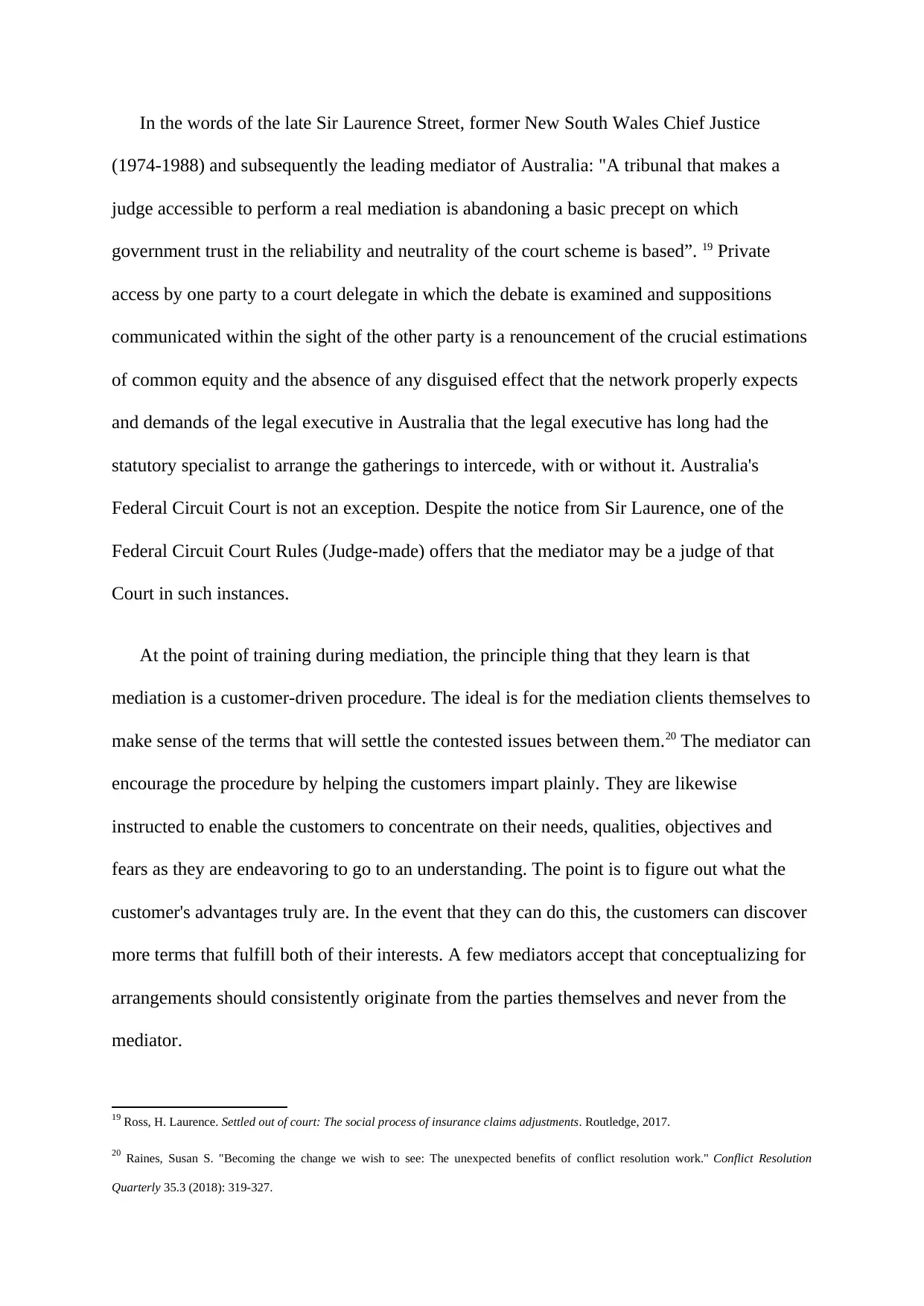
In the words of the late Sir Laurence Street, former New South Wales Chief Justice
(1974-1988) and subsequently the leading mediator of Australia: "A tribunal that makes a
judge accessible to perform a real mediation is abandoning a basic precept on which
government trust in the reliability and neutrality of the court scheme is based”. 19 Private
access by one party to a court delegate in which the debate is examined and suppositions
communicated within the sight of the other party is a renouncement of the crucial estimations
of common equity and the absence of any disguised effect that the network properly expects
and demands of the legal executive in Australia that the legal executive has long had the
statutory specialist to arrange the gatherings to intercede, with or without it. Australia's
Federal Circuit Court is not an exception. Despite the notice from Sir Laurence, one of the
Federal Circuit Court Rules (Judge-made) offers that the mediator may be a judge of that
Court in such instances.
At the point of training during mediation, the principle thing that they learn is that
mediation is a customer-driven procedure. The ideal is for the mediation clients themselves to
make sense of the terms that will settle the contested issues between them.20 The mediator can
encourage the procedure by helping the customers impart plainly. They are likewise
instructed to enable the customers to concentrate on their needs, qualities, objectives and
fears as they are endeavoring to go to an understanding. The point is to figure out what the
customer's advantages truly are. In the event that they can do this, the customers can discover
more terms that fulfill both of their interests. A few mediators accept that conceptualizing for
arrangements should consistently originate from the parties themselves and never from the
mediator.
19 Ross, H. Laurence. Settled out of court: The social process of insurance claims adjustments. Routledge, 2017.
20 Raines, Susan S. "Becoming the change we wish to see: The unexpected benefits of conflict resolution work." Conflict Resolution
Quarterly 35.3 (2018): 319-327.
(1974-1988) and subsequently the leading mediator of Australia: "A tribunal that makes a
judge accessible to perform a real mediation is abandoning a basic precept on which
government trust in the reliability and neutrality of the court scheme is based”. 19 Private
access by one party to a court delegate in which the debate is examined and suppositions
communicated within the sight of the other party is a renouncement of the crucial estimations
of common equity and the absence of any disguised effect that the network properly expects
and demands of the legal executive in Australia that the legal executive has long had the
statutory specialist to arrange the gatherings to intercede, with or without it. Australia's
Federal Circuit Court is not an exception. Despite the notice from Sir Laurence, one of the
Federal Circuit Court Rules (Judge-made) offers that the mediator may be a judge of that
Court in such instances.
At the point of training during mediation, the principle thing that they learn is that
mediation is a customer-driven procedure. The ideal is for the mediation clients themselves to
make sense of the terms that will settle the contested issues between them.20 The mediator can
encourage the procedure by helping the customers impart plainly. They are likewise
instructed to enable the customers to concentrate on their needs, qualities, objectives and
fears as they are endeavoring to go to an understanding. The point is to figure out what the
customer's advantages truly are. In the event that they can do this, the customers can discover
more terms that fulfill both of their interests. A few mediators accept that conceptualizing for
arrangements should consistently originate from the parties themselves and never from the
mediator.
19 Ross, H. Laurence. Settled out of court: The social process of insurance claims adjustments. Routledge, 2017.
20 Raines, Susan S. "Becoming the change we wish to see: The unexpected benefits of conflict resolution work." Conflict Resolution
Quarterly 35.3 (2018): 319-327.
⊘ This is a preview!⊘
Do you want full access?
Subscribe today to unlock all pages.

Trusted by 1+ million students worldwide
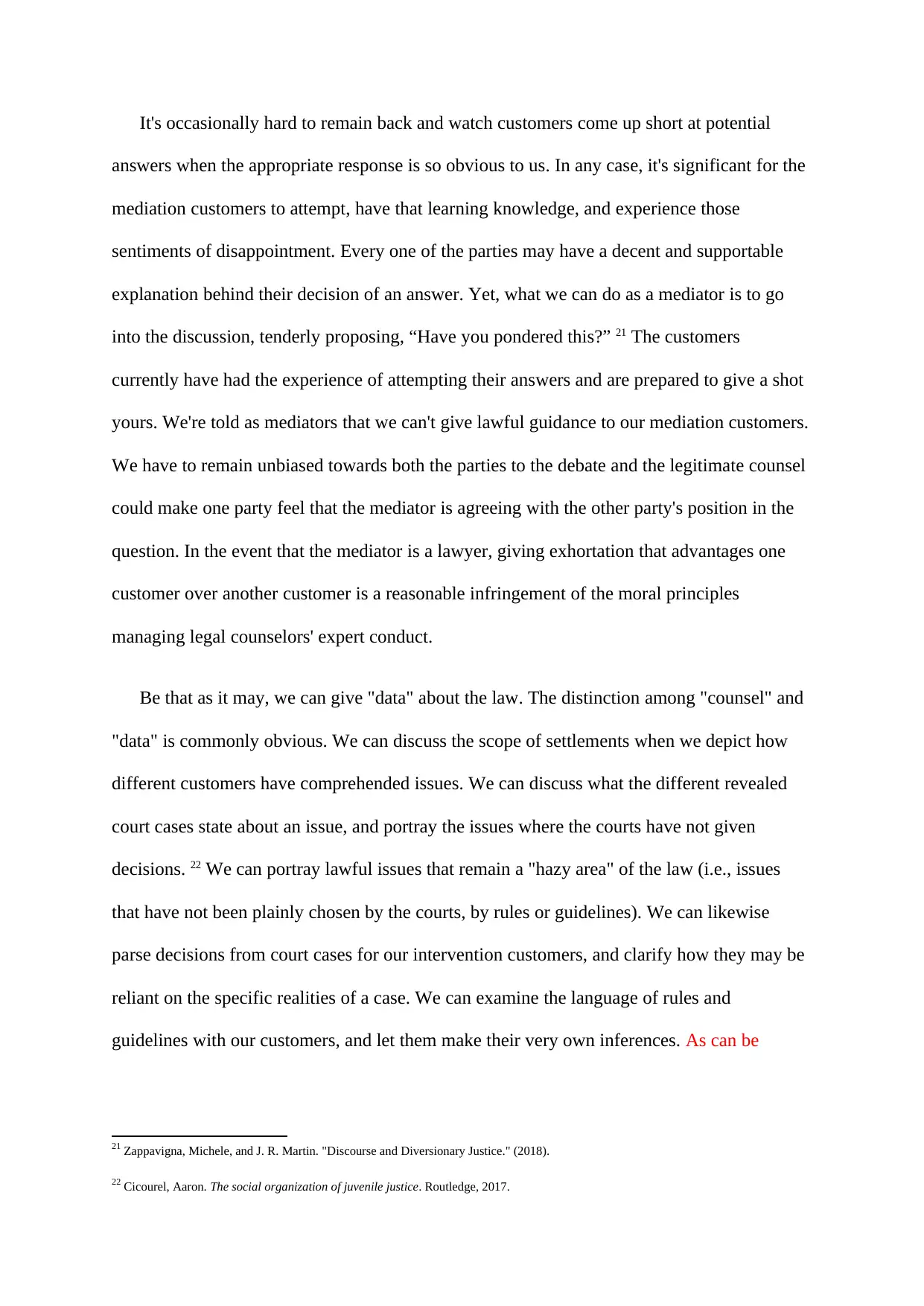
It's occasionally hard to remain back and watch customers come up short at potential
answers when the appropriate response is so obvious to us. In any case, it's significant for the
mediation customers to attempt, have that learning knowledge, and experience those
sentiments of disappointment. Every one of the parties may have a decent and supportable
explanation behind their decision of an answer. Yet, what we can do as a mediator is to go
into the discussion, tenderly proposing, “Have you pondered this?” 21 The customers
currently have had the experience of attempting their answers and are prepared to give a shot
yours. We're told as mediators that we can't give lawful guidance to our mediation customers.
We have to remain unbiased towards both the parties to the debate and the legitimate counsel
could make one party feel that the mediator is agreeing with the other party's position in the
question. In the event that the mediator is a lawyer, giving exhortation that advantages one
customer over another customer is a reasonable infringement of the moral principles
managing legal counselors' expert conduct.
Be that as it may, we can give "data" about the law. The distinction among "counsel" and
"data" is commonly obvious. We can discuss the scope of settlements when we depict how
different customers have comprehended issues. We can discuss what the different revealed
court cases state about an issue, and portray the issues where the courts have not given
decisions. 22 We can portray lawful issues that remain a "hazy area" of the law (i.e., issues
that have not been plainly chosen by the courts, by rules or guidelines). We can likewise
parse decisions from court cases for our intervention customers, and clarify how they may be
reliant on the specific realities of a case. We can examine the language of rules and
guidelines with our customers, and let them make their very own inferences. As can be
21 Zappavigna, Michele, and J. R. Martin. "Discourse and Diversionary Justice." (2018).
22 Cicourel, Aaron. The social organization of juvenile justice. Routledge, 2017.
answers when the appropriate response is so obvious to us. In any case, it's significant for the
mediation customers to attempt, have that learning knowledge, and experience those
sentiments of disappointment. Every one of the parties may have a decent and supportable
explanation behind their decision of an answer. Yet, what we can do as a mediator is to go
into the discussion, tenderly proposing, “Have you pondered this?” 21 The customers
currently have had the experience of attempting their answers and are prepared to give a shot
yours. We're told as mediators that we can't give lawful guidance to our mediation customers.
We have to remain unbiased towards both the parties to the debate and the legitimate counsel
could make one party feel that the mediator is agreeing with the other party's position in the
question. In the event that the mediator is a lawyer, giving exhortation that advantages one
customer over another customer is a reasonable infringement of the moral principles
managing legal counselors' expert conduct.
Be that as it may, we can give "data" about the law. The distinction among "counsel" and
"data" is commonly obvious. We can discuss the scope of settlements when we depict how
different customers have comprehended issues. We can discuss what the different revealed
court cases state about an issue, and portray the issues where the courts have not given
decisions. 22 We can portray lawful issues that remain a "hazy area" of the law (i.e., issues
that have not been plainly chosen by the courts, by rules or guidelines). We can likewise
parse decisions from court cases for our intervention customers, and clarify how they may be
reliant on the specific realities of a case. We can examine the language of rules and
guidelines with our customers, and let them make their very own inferences. As can be
21 Zappavigna, Michele, and J. R. Martin. "Discourse and Diversionary Justice." (2018).
22 Cicourel, Aaron. The social organization of juvenile justice. Routledge, 2017.
Paraphrase This Document
Need a fresh take? Get an instant paraphrase of this document with our AI Paraphraser
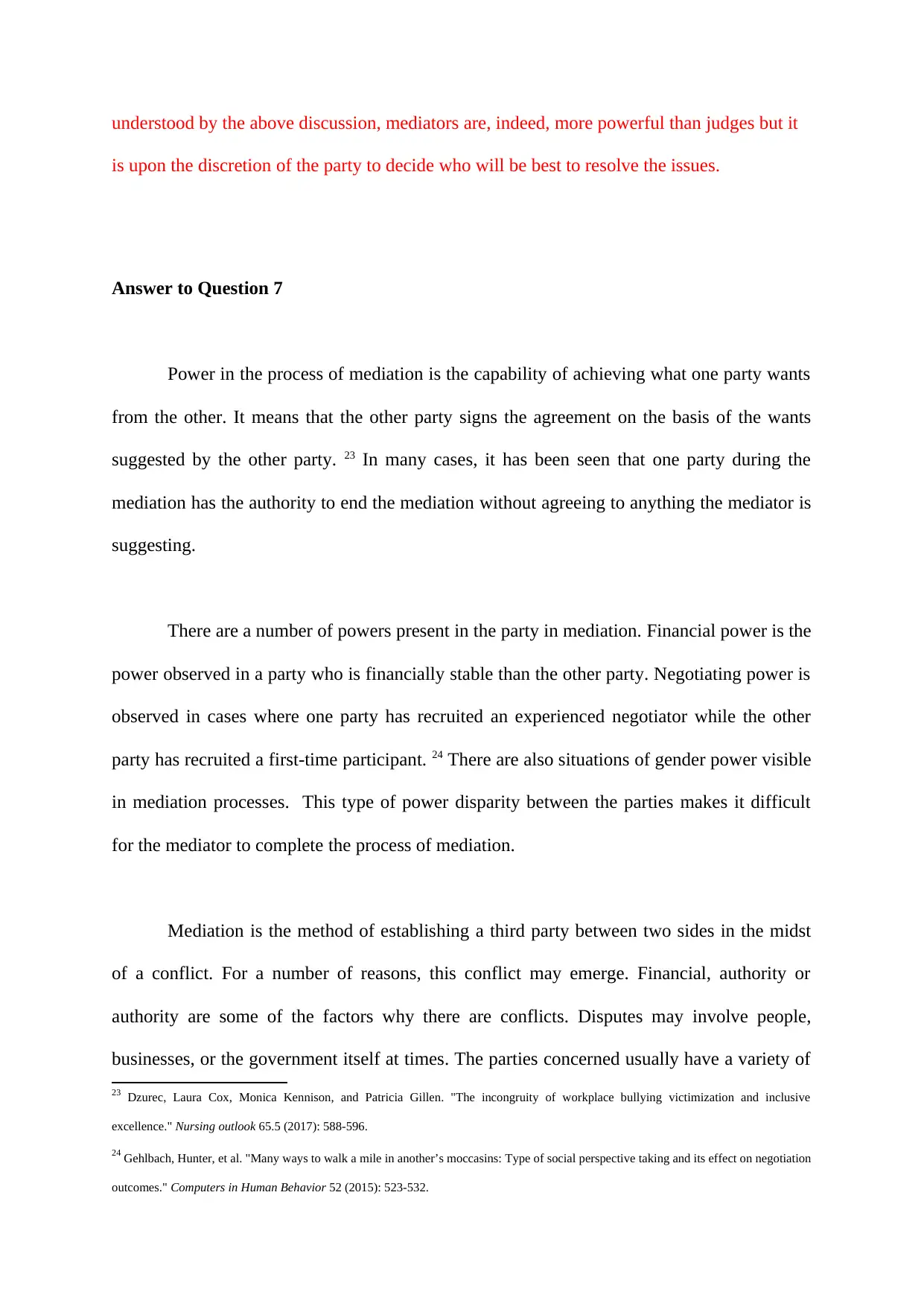
understood by the above discussion, mediators are, indeed, more powerful than judges but it
is upon the discretion of the party to decide who will be best to resolve the issues.
Answer to Question 7
Power in the process of mediation is the capability of achieving what one party wants
from the other. It means that the other party signs the agreement on the basis of the wants
suggested by the other party. 23 In many cases, it has been seen that one party during the
mediation has the authority to end the mediation without agreeing to anything the mediator is
suggesting.
There are a number of powers present in the party in mediation. Financial power is the
power observed in a party who is financially stable than the other party. Negotiating power is
observed in cases where one party has recruited an experienced negotiator while the other
party has recruited a first-time participant. 24 There are also situations of gender power visible
in mediation processes. This type of power disparity between the parties makes it difficult
for the mediator to complete the process of mediation.
Mediation is the method of establishing a third party between two sides in the midst
of a conflict. For a number of reasons, this conflict may emerge. Financial, authority or
authority are some of the factors why there are conflicts. Disputes may involve people,
businesses, or the government itself at times. The parties concerned usually have a variety of
23 Dzurec, Laura Cox, Monica Kennison, and Patricia Gillen. "The incongruity of workplace bullying victimization and inclusive
excellence." Nursing outlook 65.5 (2017): 588-596.
24 Gehlbach, Hunter, et al. "Many ways to walk a mile in another’s moccasins: Type of social perspective taking and its effect on negotiation
outcomes." Computers in Human Behavior 52 (2015): 523-532.
is upon the discretion of the party to decide who will be best to resolve the issues.
Answer to Question 7
Power in the process of mediation is the capability of achieving what one party wants
from the other. It means that the other party signs the agreement on the basis of the wants
suggested by the other party. 23 In many cases, it has been seen that one party during the
mediation has the authority to end the mediation without agreeing to anything the mediator is
suggesting.
There are a number of powers present in the party in mediation. Financial power is the
power observed in a party who is financially stable than the other party. Negotiating power is
observed in cases where one party has recruited an experienced negotiator while the other
party has recruited a first-time participant. 24 There are also situations of gender power visible
in mediation processes. This type of power disparity between the parties makes it difficult
for the mediator to complete the process of mediation.
Mediation is the method of establishing a third party between two sides in the midst
of a conflict. For a number of reasons, this conflict may emerge. Financial, authority or
authority are some of the factors why there are conflicts. Disputes may involve people,
businesses, or the government itself at times. The parties concerned usually have a variety of
23 Dzurec, Laura Cox, Monica Kennison, and Patricia Gillen. "The incongruity of workplace bullying victimization and inclusive
excellence." Nursing outlook 65.5 (2017): 588-596.
24 Gehlbach, Hunter, et al. "Many ways to walk a mile in another’s moccasins: Type of social perspective taking and its effect on negotiation
outcomes." Computers in Human Behavior 52 (2015): 523-532.
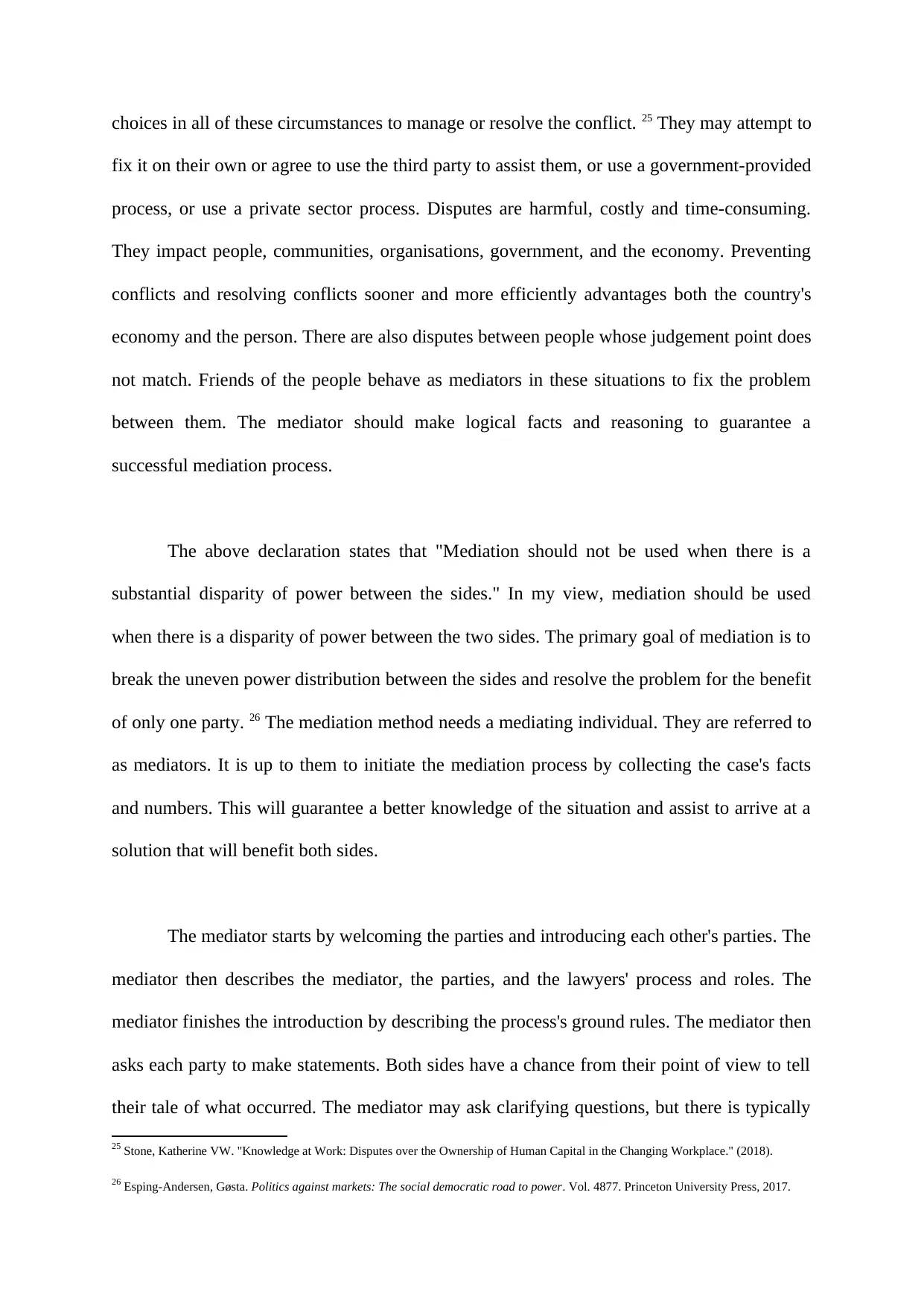
choices in all of these circumstances to manage or resolve the conflict. 25 They may attempt to
fix it on their own or agree to use the third party to assist them, or use a government-provided
process, or use a private sector process. Disputes are harmful, costly and time-consuming.
They impact people, communities, organisations, government, and the economy. Preventing
conflicts and resolving conflicts sooner and more efficiently advantages both the country's
economy and the person. There are also disputes between people whose judgement point does
not match. Friends of the people behave as mediators in these situations to fix the problem
between them. The mediator should make logical facts and reasoning to guarantee a
successful mediation process.
The above declaration states that "Mediation should not be used when there is a
substantial disparity of power between the sides." In my view, mediation should be used
when there is a disparity of power between the two sides. The primary goal of mediation is to
break the uneven power distribution between the sides and resolve the problem for the benefit
of only one party. 26 The mediation method needs a mediating individual. They are referred to
as mediators. It is up to them to initiate the mediation process by collecting the case's facts
and numbers. This will guarantee a better knowledge of the situation and assist to arrive at a
solution that will benefit both sides.
The mediator starts by welcoming the parties and introducing each other's parties. The
mediator then describes the mediator, the parties, and the lawyers' process and roles. The
mediator finishes the introduction by describing the process's ground rules. The mediator then
asks each party to make statements. Both sides have a chance from their point of view to tell
their tale of what occurred. The mediator may ask clarifying questions, but there is typically
25 Stone, Katherine VW. "Knowledge at Work: Disputes over the Ownership of Human Capital in the Changing Workplace." (2018).
26 Esping-Andersen, Gøsta. Politics against markets: The social democratic road to power. Vol. 4877. Princeton University Press, 2017.
fix it on their own or agree to use the third party to assist them, or use a government-provided
process, or use a private sector process. Disputes are harmful, costly and time-consuming.
They impact people, communities, organisations, government, and the economy. Preventing
conflicts and resolving conflicts sooner and more efficiently advantages both the country's
economy and the person. There are also disputes between people whose judgement point does
not match. Friends of the people behave as mediators in these situations to fix the problem
between them. The mediator should make logical facts and reasoning to guarantee a
successful mediation process.
The above declaration states that "Mediation should not be used when there is a
substantial disparity of power between the sides." In my view, mediation should be used
when there is a disparity of power between the two sides. The primary goal of mediation is to
break the uneven power distribution between the sides and resolve the problem for the benefit
of only one party. 26 The mediation method needs a mediating individual. They are referred to
as mediators. It is up to them to initiate the mediation process by collecting the case's facts
and numbers. This will guarantee a better knowledge of the situation and assist to arrive at a
solution that will benefit both sides.
The mediator starts by welcoming the parties and introducing each other's parties. The
mediator then describes the mediator, the parties, and the lawyers' process and roles. The
mediator finishes the introduction by describing the process's ground rules. The mediator then
asks each party to make statements. Both sides have a chance from their point of view to tell
their tale of what occurred. The mediator may ask clarifying questions, but there is typically
25 Stone, Katherine VW. "Knowledge at Work: Disputes over the Ownership of Human Capital in the Changing Workplace." (2018).
26 Esping-Andersen, Gøsta. Politics against markets: The social democratic road to power. Vol. 4877. Princeton University Press, 2017.
⊘ This is a preview!⊘
Do you want full access?
Subscribe today to unlock all pages.

Trusted by 1+ million students worldwide
1 out of 23
Related Documents
Your All-in-One AI-Powered Toolkit for Academic Success.
+13062052269
info@desklib.com
Available 24*7 on WhatsApp / Email
![[object Object]](/_next/static/media/star-bottom.7253800d.svg)
Unlock your academic potential
Copyright © 2020–2026 A2Z Services. All Rights Reserved. Developed and managed by ZUCOL.





